动名词作主语和宾语
- 格式:doc
- 大小:56.00 KB
- 文档页数:7


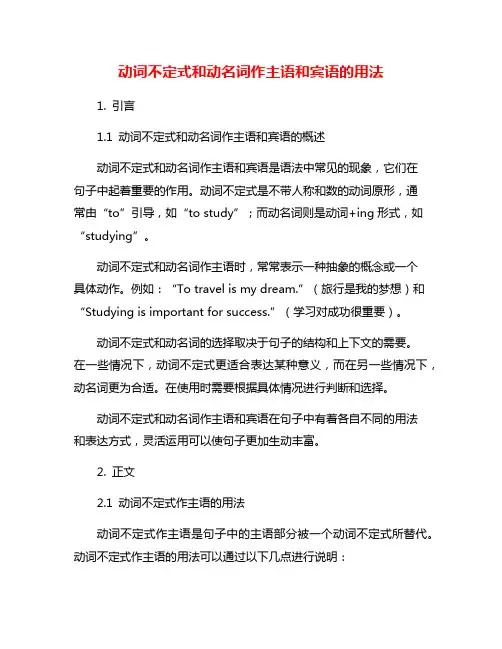
动词不定式和动名词作主语和宾语的用法1. 引言1.1 动词不定式和动名词作主语和宾语的概述动词不定式和动名词作主语和宾语是语法中常见的现象,它们在句子中起着重要的作用。
动词不定式是不带人称和数的动词原形,通常由“to”引导,如“to study”;而动名词则是动词+ing形式,如“studying”。
动词不定式和动名词作主语时,常常表示一种抽象的概念或一个具体动作。
例如:“To travel is my dream.”(旅行是我的梦想)和“Studying is important for success.”(学习对成功很重要)。
动词不定式和动名词的选择取决于句子的结构和上下文的需要。
在一些情况下,动词不定式更适合表达某种意义,而在另一些情况下,动名词更为合适。
在使用时需要根据具体情况进行判断和选择。
动词不定式和动名词作主语和宾语在句子中有着各自不同的用法和表达方式,灵活运用可以使句子更加生动丰富。
2. 正文2.1 动词不定式作主语的用法动词不定式作主语是句子中的主语部分被一个动词不定式所替代。
动词不定式作主语的用法可以通过以下几点进行说明:1. 表示一种行为或动作的意图或目的。
例如:"学习是成功的关键。
"2. 表示一种抽象的概念或观念。
例如:"帮助他人是一种美德。
"3. 在句子中作为主语时,通常放在句首位置。
例如:"抽烟会影响健康。
"4. 动词不定式作主语时,动词不定式通常是不带to的形式。
例如:"去旅行是我的梦想。
"5. 在某些情况下,动词不定式作主语时可以使用to的形式。
例如:"To learn a new language is challenging."动词不定式作主语可以使句子更加简洁明了,同时也可以突出所表达的意思或观点。
在写作中,我们可以适当运用动词不定式作主语来丰富句子结构,提高文章的表达力和逻辑性。
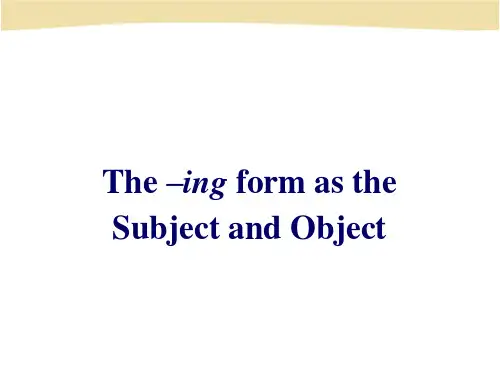
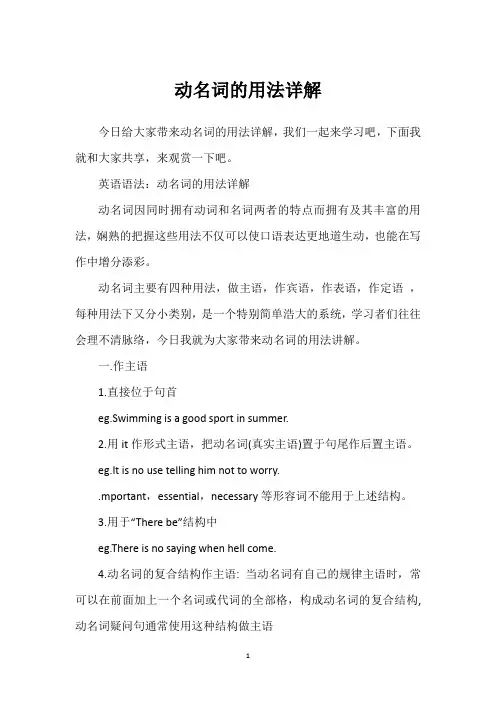
动名词的用法详解今日给大家带来动名词的用法详解,我们一起来学习吧,下面我就和大家共享,来观赏一下吧。
英语语法:动名词的用法详解动名词因同时拥有动词和名词两者的特点而拥有及其丰富的用法,娴熟的把握这些用法不仅可以使口语表达更地道生动,也能在写作中增分添彩。
动名词主要有四种用法,做主语,作宾语,作表语,作定语,每种用法下又分小类别,是一个特别简单浩大的系统,学习者们往往会理不清脉络,今日我就为大家带来动名词的用法讲解。
一.作主语1.直接位于句首eg.Swimming is a good sport in summer.2.用it作形式主语,把动名词(真实主语)置于句尾作后置主语。
eg.It is no use telling him not to worry..mportant,essential,necessary等形容词不能用于上述结构。
3.用于“There be”结构中eg.There is no saying when hell come.4.动名词的复合结构作主语: 当动名词有自己的规律主语时,常可以在前面加上一个名词或代词的全部格,构成动名词的复合结构,动名词疑问句通常使用这种结构做主语eg.Their coming to help was a great encouragement to us.Does your saying that mean anything to him?二.作宾语1.作动词的宾语某些动词后消失非限定性动词时只能用动名词作宾语,不能用不定式。
不定式通常指某种特定的动作,但动名词表示泛指,常见的此类动词有:admit,appreciate,excuse,stand,advise,allow,permit,avoid,consider,enjoy,f inish,give up,cannot help,imagine,include,keep,understand,keepon,mind,report,risk,miss,put off,delay,practise,resist,suggest,depend on,think about,set about,succeed in,worry about,burst out,insist on,feel like,be used to,get used to,devote…to…,look forward to,pay attention to,get down to,escape and so on.eg.They went on walking and never stopped talking.他们连续走,说个不停。

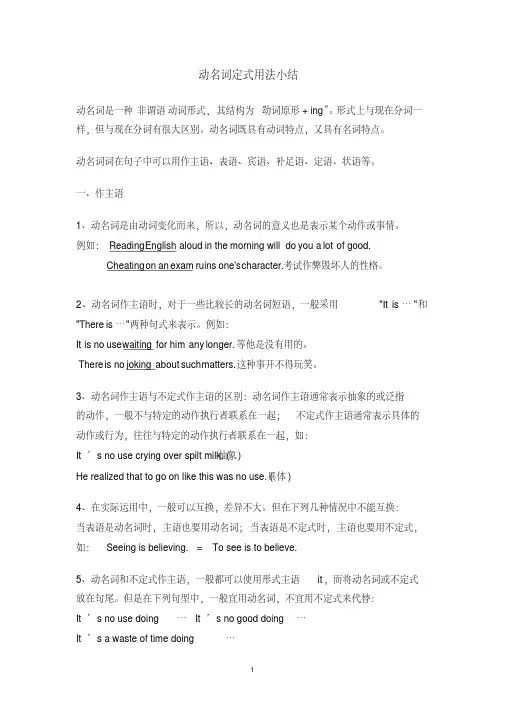
动名词定式用法小结动名词是一种非谓语动词形式,其结构为“动词原形+ ing”。
形式上与现在分词一样,但与现在分词有很大区别。
动名词既具有动词特点,又具有名词特点。
动名词词在句子中可以用作主语、表语、宾语、补足语、定语、状语等。
一、作主语1、动名词是由动词变化而来,所以,动名词的意义也是表示某个动作或事情。
例如:ReadingEnglish aloud in the morning will do you a lot of good.Cheatingon an exam ruins one'scharacter.考试作弊毁坏人的性格。
2、动名词作主语时,对于一些比较长的动名词短语,一般采用"It is…"和"There is…"两种句式来表示。
例如:It is no usewaiting for him any longer.等他是没有用的。
Thereis no joking about suchmatters.这种事开不得玩笑。
3、动名词作主语与不定式作主语的区别:动名词作主语通常表示抽象的或泛指的动作,一般不与特定的动作执行者联系在一起;不定式作主语通常表示具体的动作或行为,往往与特定的动作执行者联系在一起,如:抽象)It’s no use crying over spilt milk. (He realized that to go on like this was no use. (具体)4、在实际运用中,一般可以互换,差异不大。
但在下列几种情况中不能互换:当表语是动名词时,主语也要用动名词;当表语是不定式时,主语也要用不定式,如:Seeing is believing. = To see is to believe.5、动名词和不定式作主语,一般都可以使用形式主语it,而将动名词或不定式放在句尾。
但是在下列句型中,一般宜用动名词,不宜用不定式来代替:It’s no use doing …It’s no good doing…It’s a waste of time doing …二、作表语1、动名词作表语与现在分词作表语的区别:动名词作表语时相当于名词,说明主语的含义及内容,它与主语是同等关系,主语与表语互换位置不影响句子的基本含义,但不可用副词来修饰。
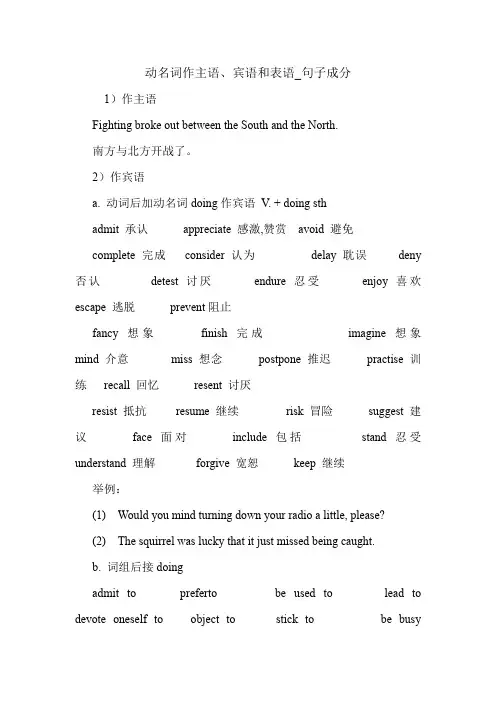
动名词作主语、宾语和表语_句子成分1)作主语Fighting broke out between the South and the North.南方与北方开战了。
2)作宾语a. 动词后加动名词doing作宾语V. + doing sthadmit 承认appreciate 感激,赞赏avoid 避免complete 完成consider 认为delay 耽误deny 否认detest 讨厌endure 忍受enjoy 喜欢escape 逃脱prevent阻止fancy 想象finish 完成imagine 想象mind 介意miss 想念postpone 推迟practise 训练recall 回忆resent 讨厌resist 抵抗resume 继续risk 冒险suggest 建议face 面对include 包括stand 忍受understand 理解forgive 宽恕keep 继续举例:(1)Would you mind turning down your radio a little, please?(2)The squirrel was lucky that it just missed being caught.b. 词组后接doingadmit to preferto be used to lead to devote oneself to object to stick to be busylook forward to to为介词)no good,no use,It’s worth,as well as,can’t help,It’s no use /good be tired ofbe fond of be capable of be afraid ofbe proud of think of / about hold offput off keep on insist on count on / uponset about be successful in good at take upgive up burst out prevent from3)作表语Her job is washing,cleaning and taking care of the children.。


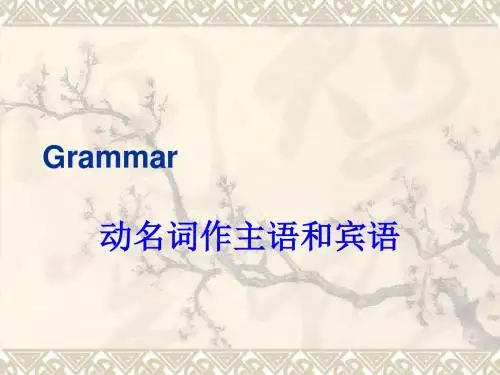
动名词的用法动名词是英语语法中的一个重要概念。
它可以起名词的作用,因此可以用作主语、宾语、表语、介词宾语等。
此外,动名词也可以用作形容词或副词的补语,或者在复合句中起连接语的作用。
接下来,本文将详细介绍动名词的各种用法和注意事项。
一、动名词作主语动名词作主语时,通常表示一种习惯、家庭、嗜好、职业、情感、思考等抽象概念,而不是具体的物质和行为。
例句:- Swimming is a wonderful way to keep fit. 游泳是保持健康的一种绝妙方式。
- Studying abroad is his dream. 出国留学是他的梦想。
- Helping others is a virtue. 帮助他人是一种美德。
- Writing poems is his hobby. 写诗是他的爱好。
二、动名词作宾语动名词作宾语时,通常表示一种行为、活动、计划等。
常见的动词包括admit, appreciate, avoid, postpone, practice等。
例句:- I enjoy reading books. 我喜欢读书。
- He avoids speaking in public. 他避免在公众场合讲话。
- The company is considering expanding overseas. 公司正在考虑扩展海外市场。
- She decided to postpone her wedding. 她决定推迟婚礼。
三、动名词作表语动名词作表语时,通常表示一种状态或特点。
常见的动词包括 be, become, seem, feel等。
例句:- Her favorite leisure activity is swimming. 她最喜欢的休闲活动是游泳。
- The idea of traveling alone seemed daunting to him. 独自旅行的想法对他来说看起来很艰巨。
基础语法讲解动名词——动名词作主语、宾语和表语1)作主语。
例如:Fighting broke out between the South and the North. 南方与北方开战了。
2)作宾语a. 有些动词可以用动名词作宾语。
例如:例如:Would you mind turning down your radio a little, please? 你把收音机音量调小一点,好吗The squirrel was lucky that it just missed being caught. 这松鼠幸运得很,刚逃避了被逮住的厄运。
b. 有些结构后面可以用动名词作宾语或其他成分。
例如:3)作表语,对主语说明、解释。
例如:Her job is washing, cleaning and taking care of the children. 她的工作是洗刷、清扫和照顾孩子。
比较:She is washing, cleaning and taking care of the children.4)作定语,一般表示所修饰名词事物的用途。
例如:a writing desk=a desk for writing 写字台a swimming pool=a pool swimming 游泳池有些动名词作定语,与所修饰的名词关系比较复杂。
例如:boiling point=a temperature point at which something begins to boil 沸点a walking tractor=a tractor which a driver can operate while he or she is walking behind it 手扶拖拉机。
动词的动名词用法动名词是表示动作或状态的名词形式,它的构成是将动词加上-ing形式的词尾。
在英语中,动名词是一种特殊的名词形式,它可以充当主语、宾语、介词宾语等多种语法功能。
在本文中,将详细介绍动词的动名词用法及其在句子中的应用。
一、动名词作主语动名词可以作为句子的主语,此时常常采用以下结构:- 动名词 + 修饰词例如:Swimming is good exercise. (游泳是一种好的运动。
)- 带有名词的动名词 + 修饰词例如:Playing basketball is my hobby. (打篮球是我的爱好。
)二、动名词作宾语许多动词后面可以接动名词作宾语,这些动词包括但不限于:enjoy, finish, keep, miss, practice, suggest等。
以下是一些具体例子:- I enjoy swimming in the river in summer. (我喜欢夏天在河里游泳。
) - She suggested going to the museum for our field trip. (她建议我们去博物馆进行实地考察。
)- He missed hearing the important news. (他没听到那个重要的消息。
)三、动名词作介词宾语动名词还可以作为介词的宾语,通常出现在介词的后面。
以下是一些常见的搭配:- I am looking forward to meeting my friends tomorrow. (我期待明天见到我的朋友们。
)- Thank you for helping me with my homework. (谢谢你帮助我做作业。
)- She is good at playing the piano. (她擅长弹钢琴。
)四、动名词作定语和表语动名词还可以用作名词的修饰语,此时相当于形容词,用来修饰名词。
以下是一些例子:- The running water is so clear. (流动的水很清澈。
动名词作主语、宾语和表语用法1)作主语Fighting broke out between the South and the North.南方与北方开战了。
2)作宾语a. 动词后加动名词doing作宾语 V. + doing sthadmit 承认appreciate 感激,赞赏avoid 避免complete 完成consider 认为delay 耽误deny 否认detest 讨厌 endure 忍受enjoy 喜欢escape 逃脱prevent阻止fancy 想象finish 完成imagine 想象mind 介意miss 想念 postpone 推迟 practise 训练 recall 回忆resent 讨厌resist 抵抗resume 继续risk 冒险suggest 建议face 面对 include 包括stand 忍受understand 理解 forgive 宽恕 keep 继续举例:(1) Would you mind turning down your radio a little, please?(2) The squirrel was lucky that it just missed being caught.b. 词组后接doingadmit to prefer…to be used to lead to devote oneself to object to stick to be busy look forward to to为介词)no good, no use, It's worth…, as well as,can't help, It's no use /good be tired ofbe fond of be capable of be afraid ofbe proud of think of / about hold offput off keep on insist on count on / uponset about be successful in good at take upgive up burst out prevent … from…3)作表语Her job is washing,cleaning and taking care of the children.。
动名词作主语[考点导航]It’s necessary to be prepared for a job interview. _______ the answers ready will be of great help.A. To have hadB. Having hadC. HaveD. Having解析:答案为D。
Having the answers ready是动名词在句中作主语的用法。
【重点归纳】动名词是英语中动词的非谓语形式之一,起名词的作用,但是仍然保留动词的特性,可以有自己的宾语、状语等。
动名词作主语的主要用法如下:1. 动名词直接放在句首作主语。
如:Taking more exercise will keep you healthy.2. 动名词在“It is no use (no good, fun, a waste of time) 等+ 动名词”结构中作主语,it为形式主语。
如:It is no good writing to him; he never answers letters.It is no use complaining; the company won’t do anything about it.3. 动名词在“It is useless (nice, good, interesting, worthwhile) 等形容词+ doing”结构中作主语。
如:It is good having a walk after supper.4. 用于布告形式的省略结构中。
如:No smoking! (= No smoking is allowed!)5. 动名词的复合结构作主语。
如:有时可以在动名词前面加上一个名词或代词的所有格,构成动名词的复合结构,此时,该所有格作动名词的逻辑主语。
动名词的复合结构也可以在句中作主语。
如:Their coming to help was a great encouragement to us.动名词作宾语[考点导航]Susan wanted to be independent of her parents. She tried ____alone, but she didn’t like it and moved back home. (2008湖南卷)A. livingB. to liveC. to be livingD. having lived解析:答案为A。
动名词作主语、宾语和表语1)作主语Fighting broke out between the South and the North.南方与北方开战了。
2)作宾语a. 动词后加动名词doing作宾语V. + doing sthadmit 承认appreciate 感激,赞赏avoid 避免complete 完成consider 认为delay 耽误deny 否认detest 讨厌endure 忍受enjoy 喜欢escape 逃脱prevent阻止fancy 想象finish 完成imagine 想象mind 介意miss 想念postpone 推迟practise 训练recall 回忆resent 讨厌resist 抵抗resume 继续risk 冒险suggest 建议face 面对include 包括stand 忍受understand 理解forgive 宽恕keep 继续举例:(1)Would you mind turning down your radio a little, please?(2)The squirrel was lucky that it just missed being caught.b. 词组后接doingadmit to prefer…to be used to lead to devote oneself to object to stick to be busy look forward to to为介词)no good,no use,It's worth…,as well as,can't help,It's no use /good be tired ofbe fond of be capable of be afraid ofbe proud of think of / about hold offput off keep on insist on count on / uponset about be successful in good at take upgive up burst out prevent … from…3)作表语Her job is washing,cleaning and taking care of the children.。
动名词做主语和宾语的用法及练习1.谓语用单数。
Climbing mountains is really fun.Swimming is my favorite sport.Reading is an art.Getting up early is a good habit.例:1.-What do you think made Mary so upset?-___ her new bicycle.A. As she lost B.Lost C.Losing D.Because of losing2. 使用形式主语it,而将动名词放在句尾。
It’s no use doing …It’s no good doing…It’s a waste of time doing …例:It’s no good______ (wait) here.It’s no use ______(argue) with her.It’s no good _______(smoke), you’d better give it up.It’s a waste of time _______(wait) here.No smoking ( =No smoking is allowed (here) ).作宾语习惯上接动名词作宾语的动词【附记忆口诀】其后习惯上要跟动名词作宾语的常见动词有以下词汇:, admit, appreciate, avoid, burst out, consider, delay, deny, dislike, enjoy, escape, excuse, fancy, feel like, finish, forgive, give up, (can’t) help, imagine, keep (on), mind, miss, practise, prevent, put off, resist, risk, (can’t) stand, stop, suggest, unde rstand 等。
如:用法举例:He admitted having taken the money. 他承认拿了那笔钱。
It was impossible to avoid being affected. 要想不受影响是不可能的。
She burst out crying (laughing, singing). 她突然哭(笑,唱)起来。
I’ve often considered studying abroad. 我经常在想出国留学。
They have put off leaving. 他们已推迟动身。
She enjoys helping her parents with the housework. 她喜欢帮她母亲做家务。
There is no way to escape doing the work. 没有办法逃脱做这项工作。
Please excuse my opening your letter by mistake. 请原谅我误拆了你的信。
There was a deadly silence after she finished speaking. 她说完话后是一片沉默。
Please forgive my interrupting. 请原谅我打扰了。
The doctor told me to give up smoking. 医生叫我戒烟。
Can you imagine living without electricity? 你能想象没有电的生活吗?My shoe laces keep coming undone. 我的鞋带老是松开。
Nobody mentioned going there helping her. 没有人提到要去那儿帮助她。
We don’t mind w aiting. 我们不介意等候。
He just missed being struck. 他险些儿被打着。
They are practising singing the new song. 他们正在练习唱新歌。
We decided to put off leaving. 我们决定推迟动身。
We’re willing to risk losing our jobs. 我们愿冒失业的危险。
He suggested going together in one car. 他建议大家一起坐一辆汽车去。
I just can’t understand his [him] stealing the money. 我简直无法理解他为什么要偷钱。
后面只能用动名词做宾语的动词记忆口诀考虑建议盼原谅承认推迟没得想避免错过继续练否认完成就欣赏禁止想象才冒险不禁介意准逃亡难以忍受始反对想要成功坚持忙习惯放弃有困难导致专心防道歉解析:第一句包含的动词有:consider, suggest/advise, look forward to, excuse/pardon,第二节包含的动词有:admit, delay/put off, fancy,第三句包含的动词有:avoid, miss, keep/keep on, practice,第四句句包含的动词有:deny, finish, enjoy/appreciate,第五句包含的动词有:forbid, imagine, risk第六句包含的动词有:can't help, mind, allow/permit, escape.第七句包含的动词有:can't stand(难以忍受),set about 开始,着手,object to,第八句包含动词有:feel like(想要),succeed in (成功),stick to(坚持) ,insist on(坚持,强调,坚决要求),be busy (in)(忙于做某事)第九句包含的动词有:be used/accustomed to(习惯于……),give up(放弃), havedifficulty/trouble (in), (做某事有困难)第十句包含的动词有:lead to(导致), devote to(将…奉献给;把…专用于), p revent…… from……(预防,防止),apologize for(为……道歉), ,此外,have a good/wonderful/hard time (in), spend time (in),thank you for, pay attention to, aim at 目的在于,旨在;瞄准;企图,accuse…of… 控告;谴责,get down to, etc.例如:①I really appreciate having time to relax with you on this nice island.(高考)②While shopping, people sometimes can't help being persuaded into buying something they don't really need ()③I can't stand working with Jane in the same office, she just refuses to stop talking while she works.()接动名词作宾语的动词「速记口诀」Mrs.PBlackmissedabeefbag.(P.布莱克夫人丢了一个牛肉袋。
)「妙语诠释」该句话中每个字母代表了一个动词或短语,这些动词要求后面跟动名词作宾语。
这些动词分别是:M=mind,r=risk,s=succeed in,P=practice,B=be busy,l=look forward to,a=admit,c=can‘thelp,k=keep on,m=miss,i=insist on,s=suggest,s=stop,e=enjoy,d=delay,a=avoid,b=be worth,a=advise,g=give up.例: Our monitor suggested _____a discussion of this subject.A.to have B.should have C.have D.having(2)只能接不定式作宾语的动词:happen 碰巧,offer 主动提出,promise 答应,agree 同意,refuse拒绝,decide 决定,determine 决定、决心,pretend 假装,fail 未能够,learn 学习,wish希望,hope,希望expect,期待,期望afford 负担得起。
(3)接动名词、不定式均可,意义相同的动词:like,love,dislike,hate,begin,star,continue,prefer,can’t bear/endure 无法忍受,cease停止。
注1:v-ing形式表示经常性、概括性的动作,不定式表示具体的、特定的某一次动作。
如:She likes singing, but she doesn’t like to sing today.注2:在begin, start, continue后跟v-ing形式和不定式作宾语没有区别,但start,begin 本身为进行式或后接realize, wonder, understand等心理活动的词时,常用不定式作宾语。
如:I began to realize that I was wrong.(4)下列单词接动名词和不定式均可,但意义不同的动词:forget,go on,mean,regret,remember,stop,try等Stop to do 停下来去做stop doing 停止做Forget to do 忘记要做forget doing 忘记做过Remember to do 记得要做remember doing 记得做过Regret to do 遗憾要做regret doing 后悔做过Try to do 企图做,尽力做try doing 试着做Go on to do 继续做(另一件事)go on doing 继续做(同一件事)Mean to do 打算做mean doing 意味做例:1. In some parts of London, missing a bus means _______ for another hour.A waitingB to waitingC waitD to be waiting2.—You were brave enough to raise objections at the meeting.-Well,now I regret ___that.A.to do B.to be doing C.to have done D.having done (5)need, require, want作“需要”讲,其后用动名词的主动式表示被动意义,be worth 也有类似用法。